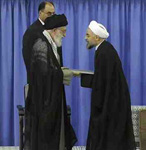 Wall Street Journal: Iranian President Hassan Rouhani’s ploy to persuade skeptical Western leaders that he is seeking a diplomatic rapprochement appears sharply at odds with the some of the policies currently being pursued by his government in Tehran.
Wall Street Journal: Iranian President Hassan Rouhani’s ploy to persuade skeptical Western leaders that he is seeking a diplomatic rapprochement appears sharply at odds with the some of the policies currently being pursued by his government in Tehran.
Tehran’s efforts to evade U.N. sanctions are at odds with the new president’s diplomatic overtures.
The Wall Street Journal
By Con Coughlin
 Iranian President Hassan Rouhani’s ploy to persuade skeptical Western leaders that he is seeking a diplomatic rapprochement appears sharply at odds with the some of the policies currently being pursued by his government in Tehran.
Iranian President Hassan Rouhani’s ploy to persuade skeptical Western leaders that he is seeking a diplomatic rapprochement appears sharply at odds with the some of the policies currently being pursued by his government in Tehran.
After the clever public-relations offensive that Mr. Rouhani mounted at last week’s U.N. gathering in New York, which culminated in a phone conversation with U.S. President Barack Obama, expectations have inevitably been raised that Iran is serious about taking a more constructive approach to negotiations over the future of its nuclear program.
Yet at the same time that Mr. Rouhani was undertaking his Manhattan charm offensive, back home in Tehran, his government’s approach told a very different story. Perhaps the most revealing insight into how the new Iranian government intends to handle its dealings with the West can be found in the regime’s attitude toward U.N. sanctions, which have been imposed in response to Iran’s decade-long refusal to compromise on the nuclear issue.
Officials responsible for monitoring the U.N. sanctions report tell me privately that in recent months, Iran has intensified its efforts to circumvent the restrictions by strengthening its trading ties with a number of neighboring countries, such as Turkey, Iraq and the United Arab Emirates.
The four rounds of sanctions that have so far been implemented by the U.N. Security Council have caused serious economic and political problems for the regime. With inflation running at around 35%, rising unemployment and a run on the rial, the parlous state of Iran’s economy became the dominant issue in last summer’s presidential election. Mr. Rouhani’s victory owed much to his promise to fix the economy at any cost.
To this end his government has stepped up efforts to develop trading ties with regional partners, with the aim of acquiring gold and foreign currency that can be used to shore up the rial. For example, Iranian bankers have successfully exploited loopholes in the U.N. sanctions to channel billions of dollars worth of gold from Turkey to the Central Bank of Iran.
Iran has also exploited its close relationship with Iraqi Prime Minister Nouri al-Maliki to acquire foreign currency through a network of Iranian money-changers who are working in major towns and cities in Iraq. The Iranians have further cultivated their trading ties with the United Arab Emirates, where they have set up a number of front companies to conceal the direct involvement of Iranian companies, such as the National Oil Company of Iran.
Iran’s sanctions-busting activities have not gone unnoticed. Last month the U.S. Treasury Department identified six individuals and four companies that it claims have been helping Iran to evade U.N. sanctions. Iran’s activities in Turkey and Iraq are also being scrutinized to see if measures can be taken to strengthen the sanctions.
The amount of effort Iran is investing in evading the sanctions is at odds with Mr. Rouhani’s claim that he wants to cooperate with the West. Then again most of the sanctions-busting operations are being orchestrated by Iran’s Revolutionary Guards, who have expressed their reservations about the wisdom of Mr. Rouhani’s attempts to engage with Mr. Obama. Upon his return to Tehran over the weekend, Mr. Rouhani had shoes thrown at him by indignant protesters. General Mohamad Ali Jafari, the head of Iran’s Revolutionary Guards, publicly criticized the Iranian president for making a “tactical error” by agreeing to speak to Mr. Obama.
One of the key questions now facing Western policy makers as they assess Mr. Rouhani’s diplomatic overture is whether or not he has the authority to negotiate a deal on Iran’s nuclear program—assuming, that is, that he really wants to. In the past, Iranian presidents have intimated they would like to end Iran’s international isolation by reaching agreement on issues such as Iran’s uranium-enrichment program, which most intelligence agencies believe is part of a clandestine plan to acquire nuclear weapons. But invariably these initiatives have failed due to the opposition of Ayatollah Ali Khamenei—Iran’s Supreme Leader and the final arbiter all decisions relating to Iran’s nuclear development.
Before Mr. Rouhani traveled to New York, Mr. Khamenei had appeared to give his blessing to fresh negotiations, saying Iran needed to demonstrate “heroic flexibility” to end its economic problems. But in yet another example of the double standards that dominate Tehran’s political culture, at the same time that the ayatollah was backing his president’s diplomatic initiative, he also appointed Ali Shamkhani, one of the founders of Iran’s nuclear program, as the new head of Iran’s National Security Council.
Like Mr. Rouhani, who served on the council for many years, Mr. Shamkhani is a veteran of previous nuclear negotiations. But while Mr. Rouhani has tried to reach a deal with his Western counterparts, Mr. Shamkhani—a former Revolutionary Guards officer—has long voiced his opposition to any form of compromise. So long as Mr. Shamkhani and Ayatollah Khamenei continue to dominate Iran’s national-security establishment, Mr. Rouhani’s room for maneuver in future negotiations with the West will be very limited indeed.
Mr. Coughlin is defense editor of London’s Daily Telegraph and the author of “Khomeini’s Ghost” (Pan Macmillan, 2009).


